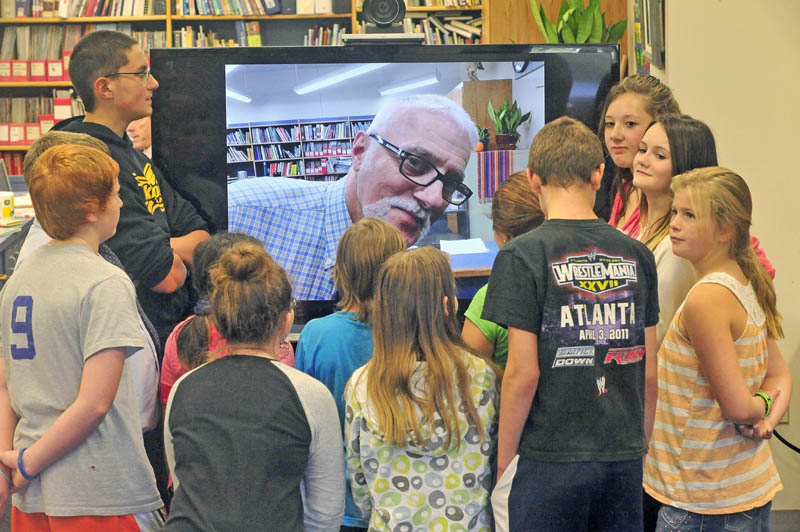VASSALBORO — Victor Esposito will be the first to tell you he’s not technologically inclined.
But that didn’t stop Esposito, 67, a Jobs for Maine Graduates master specialist who works with Vassalboro Community School, from stepping out of his 20th century bubble when stricken with an illness that prevented him from meeting with his students.
While Esposito couldn’t get to the classroom with his sixth, seventh and eighth grade students, he got the classroom to him, virtually — connecting from his hospital room via iPad.
Sitting in an Inland Hospital room getting a treatment for a brief flare-up of cellulitis, Esposito connected his tablet with one of the school’s television monitors — called a Tandberg Unit — in the library. Class was back in session.
“These guys were so animated,” Esposito said. “They’d come right up to the screen and say, ‘Hey Mr. E, how are you doing?'”
Esposito meets with groups of students three times a week as part of a collaboration between the school and Jobs for Maine Graduates. The program is a nonprofit organization that helps Maine students work on communication, time management, organizational and other social skills at more than 70 middle and high schools in the state.
Esposito works with about 100 students at the kindergarten through eighth grade school on a variety of activities that help students explore various career paths. During school activities, students working with Esposito run a school store and a snack shack, fostering business and communication skills. There are 425 students in the school.
“It teaches them civic and community responsibilities,” Esposito said. “At the middle school level, its more interactive games and other activities.”
It’s those interactive games during the first week of classes that Esposito didn’t want to miss out on while in the hospital. Esposito had an activity set up that allowed the students to develop their communication skills while learning more about their classmates. It was that relationship building that Esposito couldn’t miss.
“I missed my kids,” Esposito said. “I did it Friday because I had things I wanted to do with the kids, and especially these younger ones. Without me being there, getting them up to speed on Jobs for Maine Graduates is difficult.”
The students, perhaps not surprisingly, were enthusiastic about their virtual version of Esposito.
“We had this camera on a TV and it was just watching us,” said James Sudgen, a sixth grader.
“Some of us would be doing silly things, and he would say, ‘I see you,'” said Jasmine Plugge, another sixth grader.
While the technology wasn’t always perfect — the screen would momentarily freeze and buffer, the sound would go in and out — the students combated those problems by holding up signs letting Esposito know if his message was getting through the screen.
“We would have to hold up sign that said ‘We can’t hear you’ or ‘We can’t see you,'” Plugge said.
Despite not having Esposito physically in the classroom and the minor technical glitches, the students agreed that having Esposito available made the lesson easier to understand.
“When the ordinary teachers are here, not the substitutes, we usually get more work done because we know the teachers a little bit more,” said Ella Grouix, a sixth grader in Esposito’s class. “But when substitutes are here, it’s a little tougher.”
While ambitious, Esposito could have never attempted to teach from afar by himself. He also had the help of the school’s technology supervisor, David Trask.
“The joke is, I’m the least technological person in this school and at JMG,” Esposito said, adding that his lifestyle, one of organic foods, gardening and a summer of bare feet doesn’t really fit into the technology wizard stereotype.
It was also the bare feet that gave him the cellulitis, which is a skin infection caused by bacteria entering an open wound.
“But I’m catching up to a lot of people. You can either poo-poo all this stuff or you can embrace it. It was a lot of people embracing it.”
One of those people was the school’s Principal Dianna Gram. She watched the two classes — Esposito also did a remote lesson with his seventh graders — and the ideas for using the technology for teaching are near endless in her mind.
“We’re hitting the tip of the iceberg on what we can do,” Gram said. “We’re fostering a group of people who are comfortable with technology. We’re excited for this.”
Gram said the school has used video conferencing before, but it was usually one-on-one or someone chiming in on one.
“We’ve never used it to teach a whole class,” she said. “I envision Mr. E using this equipment to work with other JMG classes on collaboration projects.”
Gram and Esposito each said the idea would have stayed just an idea if it weren’t for Trask, the school’s technology director. Trask, who also teaches computer classes starting in kindergarten, says he can’t wait to use the new teaching tool the next time he’s away for a conference.
“Even though I’ll be off premises, I can still teach my lesson like I’m right there,” he said. “It comes down to who would you rather have in front of your kids, a substitute or the actual teacher — even if it’s virtually?”
Jesse Scardina — 861-9239
jscardina@mainetoday.com
Send questions/comments to the editors.


